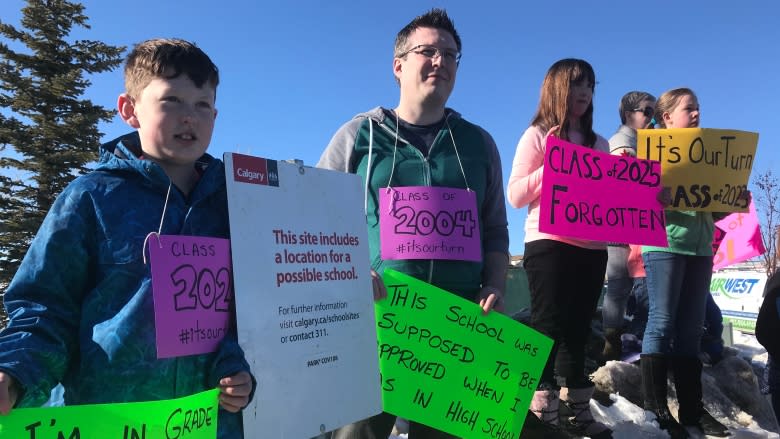CBE eagerly awaits share of 20 new schools promised province-wide in Alberta budget
Alberta's 2018 budget announced funds to build 20 new schools across the province, and the Calgary Board of Education will be anxiously waiting to see how many of the 10 new schools and 12 major modernization projects on its capital priorities list will be built.
"We have submitted our capital plan to the province and we are anticipating that 20 school announcements will be coming in this budget cycle," said CBE vice-chair Marilyn Dennis at a news conference on Thursday.
"Once we submit our priorities to the province then we wait on their response, so we are eager to see what they have to say."
The budget announced $2.2 billion in investments over the next five years on school infrastructure, including $393 million for 20 new schools and an additional $25 million to fund the modular school program that expands classroom space for overcrowded schools.
In 2018-19, the government is allocating $723 million to operate and maintain schools and $353 million for student transportation.
"Hopefully Calgary will get their fair share of [schools]," Calgary Mayor Naheed Nenshi said.
Some community schools listed on the CBE capital plan priorities list have been needed for more than a decade.
Families held a rally in north-central Calgary in early March to raise attention for the long wait for the North Calgary High School, which has been needed for a population of 120,000 in the area since 2004, parents and students said.
An advocacy group for the high school sent out a tweet asking if the funds meant the long-awaited school would finally be built.
New schools are announced in spring of each year, and the schools are ranked on a priority list based on need.
The CBE submits its list of priorities for new schools and major school upgrade projects to the province, which determines where and when the new schools will be built.
The North Calgary High School project was moved up from 8th priority to 3rd for 2019, meaning it's more likely to make the cut for next year's announcement, than this year's. Once new schools are announced, it can take three to five years before the buildings are operational.
The school board has not yet received its actual funding rates, but once those are in the CBE will present a budget assumption report to its board of trustees on April 10, with release of the board's budget to follow in May.
Dennis said the board is glad to see that the 2,000 new students joining the CBE's existing 122,000 student population will be funded, but outlined the continuing pressures of inflation and the cost of operating schools.
"Inflationary pressures are a real issue for us," said CBE chief financial officer Brad Grundy.
The board will have to find a way to fill the expected $35.5-million gap between revenue and expenses, Grundy said.
CBE is confident in its administration, Dennis says
In 2017, the province initiated an operational review of the CBE in response to concerns from parents that the school board planned to increase fees dramatically. A preliminary report found that the board was adequately funded to cover its expenses.
The CBE also faced scrutiny late last year over superintendent salaries, after it was disclosed that the chief superintendent received $295,000 per year in base salary, and would be receiving a retiring allowance of one year's salary upon leaving the job with more than a year and a half left on his contract.
But the CBE said it isn't aware of any concerns from the province and that its spending is on par with other jurisdictions.
"I'm not aware of any directions, concerns or issues form the province of Alberta concerning how the CBE spends its money," said Grundy.
"We have confidence in our administration moving forward," Dennis said.
ATA says budget isn't enough to address crowded classrooms
The Alberta Teachers' Association also expressed concerns that the budget wouldn't be enough to address the growing needs for more schools and classroom spaces in the province.
"Albertans will appreciate the government's commitment to funding enrolment growth, building new schools and tackling student hunger. But this budget does not do enough to help teachers deal with large class sizes or support students with special learning needs," said ATA president Greg Jeffery in a statement.
"Base grants have only received one small increase in seven years, and school boards are struggling to keep up with inflationary pressure."



